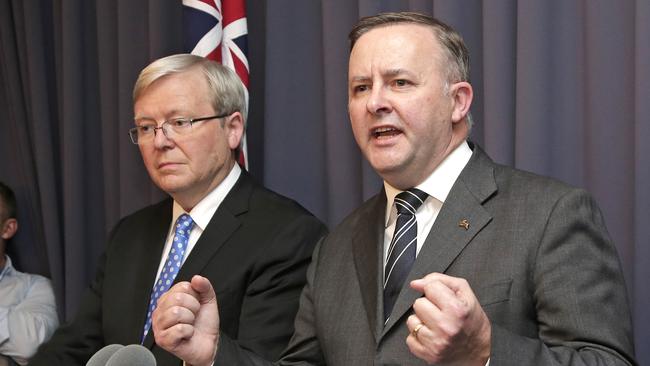
Albanese, his deputy Richard Marles, Jim Chalmers, Senate leader Penny Wong and other senior ministers are mindful of the Rudd-Gillard government in running a cabinet, managing caucus, dealing with factions and the party-union machine, and the parliament. In short, Bob Hawke is the model and Kevin Rudd is the anti-model.
In 2007, Rudd essentially dictated to caucus who would be ministers. He made this clear during the election campaign. He later sought and got a change to caucus rules that the leader, rather than MPs, selects the ministry. It challenged a century of Labor tradition. It generated lasting animosity and later was overturned.
It has been four decades since the caucus was allowed a free ballot to determine the ministry. These days, ministries are carved up by faction leaders working to complex calculations based on numbers, states and gender. Caucus then rubberstamps the deal. It is a pity there is no democracy but it does allow for effective management and no surprises.
As a 26-year caucus veteran, Albanese is more respectful of caucus than Rudd was. He is collegiate and co-operative, understands the tribal rhythms of the party, the faction leaders and MPs. He knows where power lies and how to use it. As a former faction leader he understands how to navigate the party’s Byzantine fiefdoms.
About 80 per cent of the new cabinet have ministerial experience. In 2007, John Faulkner and Simon Crean were the only cabinet members previously to have been ministers. In the Hawke cabinet, only Paul Keating, Bill Hayden and Lionel Bowen had served earlier as ministers. No member of the Whitlam cabinet had been a minister before.
Marles told me the new cabinet will be looking to adopt the Hawke model of robust debate and discussion. Ministers will be encouraged to speak beyond their portfolios on key issues. Cabinet will be a clearing house for policy and political discussion. It won’t be tightly managed like it was during the Rudd government when anyone speaking out would be met with Rudd’s blue-steel glare.
Albanese is looking to the Hawke approach. He told me he would not be a micromanager or an interventionist like Rudd. He will adopt a “chairman of the board” approach to cabinet. He will insist on proper processes, such as circulating submissions in advance of meetings, and will be on time. (Notoriously, Rudd often was late.) There will be no return of the “gang of four” that comprised Rudd, Julia Gillard, Wayne Swan and Lindsay Tanner, who decided matters outside the full cabinet. But some incoming ministers are concerned that Albanese, Marles, Chalmers, Wong and Katy Gallagher are already a quasi-leadership group. The ministers closest to Albanese are Wong and Mark Butler.
While the Labor caucus is heavily factionalised, it has little influence on policy. There is no Cold War Left-Right divide. The ministry will comprise 16 members from the Right and 14 from the Left. While Albanese is from the Left, he works well with the Right. The NSW Right faction remains the largest group in caucus with 19 members.
There is no standout successor to Albanese, which also will shape the dynamics of caucus and cabinet. In the Rudd government, the clear successor was Gillard from the get-go. In the Hawke government it became Keating. In the Whitlam government it became Hayden. There are a mix of potential leadership contenders: Marles, Chalmers, Tanya Plibersek, Chris Bowen and Tony Burke.
The party machine and affiliated unions are less influential than in any previous Labor government. Labor’s national executive remains evenly divided between Right and Left factions with Albanese holding a casting vote. Albanese, unlike Rudd, is adept at managing the party-union relationship. A member of Labor’s national executive once said to me Rudd would have survived as prime minister if he had a Chinese lunch with a bunch of union leaders once a year.
The experience of the 2010-13 minority parliament, when Albanese was leader of the house, also equips him well for managing the large crossbench of independents and minor party MPs. He will be respectful of Helen Haines, Bob Katter, Rebekha Sharkie, Andrew Wilkie, Zali Steggall and the new independents.
He also will need to work with the Greens in the Senate.
Labor has eked out a path to power, but only just with 76-77 seats. Fewer people voted Labor than in 2019. A 33 per cent primary vote is dismal. Labor lost at least two seats. Some Labor MPs think the win should have been bigger, and they are right. But Liberals face a long dark night of the soul that will work to Labor’s benefit as the Liberal heartland in Sydney, Melbourne, Brisbane, Adelaide and Perth is in revolt.
The 31st Prime Minister’s priorities include establishing the Indigenous voice to parliament, an integrity commission, the National Reconstruction Fund, Jobs and Skills Australia, implementing a new energy plan to decarbonise the economy, near universal childcare and overhauling aged care. Albanese also plans a summit with business and unions to inform a white paper on employment. There is a lot to do.
The budget is deep in the red, debt has skyrocketed and Australians face higher interest rates and cost-of-living pressures. An assertive China in the Asia-Pacific poses another difficulty. Governing is hard. The experience of the Rudd-Gillard and Abbott-Turnbull-Morrison governments underscores this. But the Albanese government is better placed than both to meet these challenges and others that are unforeseen.



When Labor MPs return to the government party room on Tuesday for the first time in nine years, they will do so with a governing culture different from that of the Rudd-Gillard government. Anthony Albanese’s ministry, to be sworn in on Wednesday, has learned the hard lessons from the last time the party was in office and is the most experienced incoming Labor government.